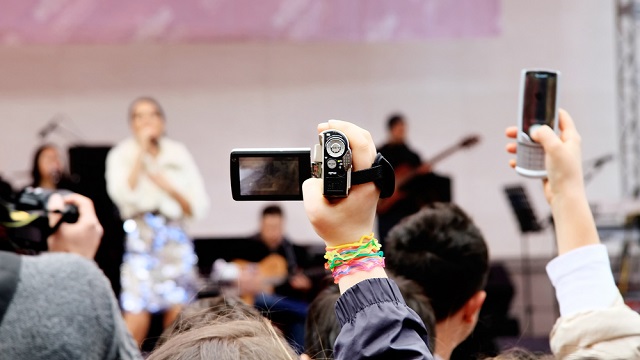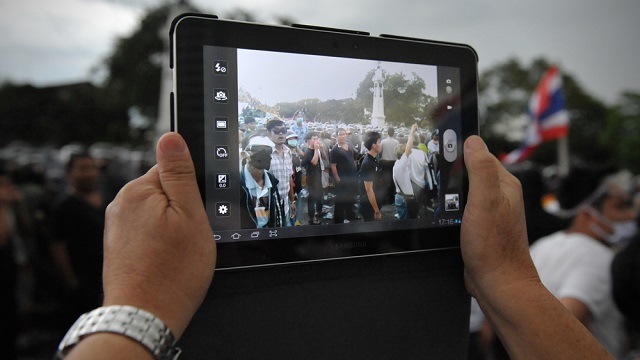Kecia Lynn
Kecia Lynn has worked as a technical writer, editor, software developer, arts administrator, summer camp director, and television host. A graduate of Case Western Reserve University and the Iowa Writers' Workshop, she is currently living in Iowa City and working on her first novel.
Writer Farhad Manjoo argues that systematic surveillance in cities that are terrorist targets may be the simplest and best way to improve security. Besides, he says, it’s not like we’re not being watched already.
Now that technology allows more people to work pretty much anywhere and at any time, what does that mean for 21st-century city planners and urban designers?
A German study showed that male test subjects were far more likely to correctly guess the emotional states of other men via eye contact. Interestingly, there may be an evolutionary basis to this.
It’s the second South American country to create a government-backed accelerator program offering funding to local and foreign talent. Up to $78 million will be offered, on the condition that the companies stay for a while.
One Today, which began a limited pilot Thursday, enables Android users to donate a dollar a day to one of several prescreened charities.
The Eye+ Window can display scenic views of any location and uses sensors to track your eye movements and adapt the image as needed, making it seem as though you’re really looking through a window.
A team at the University of Illinois claims their design could lead to microbatteries that deliver the same power as normal-sized ones, as well as normal-sized batteries that are exponentially more powerful.
An MIT engineer has designed a system that links phones together wirelessly, creating a network of shared cameras and, potentially, thousands of different photos to choose from.
Yes, it has come to this: A researcher has created a system that uses a depth-sensing camera to detect obstacles and displays warnings via a message on your smartphone screen.
Scientists borrowed the latching ability of the spiny-headed worm to create a microneedle device that is over three times stronger than staples and easier to remove, making it ideal for delicate skin grafts.
There’s still time to sign up for the International Space Apps Challenge, in which participants will attempt to provide creative answers to 50 current scientific and technological problems.
Two scientists conducted a “thought experiment” using the popular computer science law and came up with some interesting and controversial possibilities on the true origins of species.
Five percent of the world’s CO2 emissions come as a result of holiday travel. Two researchers are looking into ways to encourage vacationers to reduce their carbon footprint by using social media to share rides and information.
According to recent figures, a full 61 percent of the country is experiencing drought conditions, almost double the amount in 2011. Some are warning of a coming “megadrought” in the western US.
As the rainy season begins, even more of the mollusks are expected to emerge from hibernation and start munching…on plants, stucco, plaster, and even concrete.
Monday’s twin blasts occurred at a time when more people than ever use social media. Authorities hope the photos and videos that bombarded the Internet in the moments following the attack will prove useful in their search.
CrowdMed, launched Tuesday, is one of several Web-based platforms that anyone can use to help diagnose mystery conditions.
Not by a long shot: In a sampling of 3.9 million Facebook users, 71 percent self-censored new posts or comments. Also, men were more likely to self-censor, especially if they had a lot of male friends.
Wireless companies are offering their customers’ location data to companies that plan to use it for purposes ranging from city planning to market research.
Now that the nonprofit service that administers the high school equivalency exam has partnered with for-profit Pearson Vue Testing to create a pricier computer-only test, 40 states are looking for alternatives.
Unfortunately, it’s not because governments are getting along with each other: Deep cuts in American and European spending were balanced out by spending increases in China and Russia.
So claims a new study that asked parents from different countries to describe their children and what they considered the “right way” to rear them. Perhaps unsurprisingly, American parenting styles stand apart.
And the parents of children who attend the K-8 school, located in the Ozarks, are mostly happy about it, especially since guns are considered a normal part of life.
The energy monopoly Gazprom is pushing for greater adoption of vehicles that run on natural gas. It helps that Russia is the world’s second-largest producer of the stuff.
The government is going after 100 companies accused of exploiting young workers who are eager for experience. It’s one of several efforts to expose abuses in what some say has become “a defining characteristic” of the Millennial generation.
Canadian scientists used MRI to observe brain activity when subjects listened to music they never heard before. The reward center of the brain lit up in response to music they liked.
In the multiplayer game League of Legends, players who use abusive language can see their words used against them in a court of their peers. The technology behind this jury can be applied to other online communities.
It may sound obvious, but security experts warn that as hacking technology becomes more sophisticated, employees should take care not to reveal too much when they’re away.
The clumsily-named (by one exec’s own admission) Inactive Account Manager will take action on a user’s Google footprint if they haven’t logged in within a specified period of time.
HealthTap allows users to pose questions to a network containing thousands of physicians. In addition to providing affordable advice, the service gives doctors a way to grow their online reputation.





























